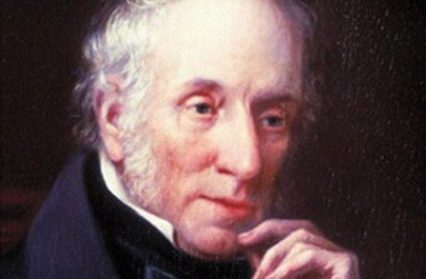In the second of our series looking at the riches of Denbigh’s literary history, John Idris Jones focuses on the love of affair Wordsworth had with the place.
In 1773, before their graduation from St John’s, Cambridge, Wordsworth and his friend Robert Jones undertook a Grand Tour on foot through Europe. The time of their journey through the Alps was, according to Dorothy, William’s sister, “..the golden and sunny spot in his life.” The tour left a deep impression on Wordsworth as a result of the political events in France. The Bastille had fallen on July 14, 1789, and its anniversary, when the King was to swear fidelity to the new Constitution was the “too-credulous day” to which the following extract refers:
Jones! as from Calais southwards you and I
Went pacing side by side, this public Way
Steamed with the pomp of a too-credulous day
When faith was pledged to new-born liberty…
This tour prompted Wordsworth to write his verse ‘Descriptive Sketches’, dedicated to “The Re. Robert Jones, Fellow of St. John’s College, Cambridge”. The following extract shows the affection between the two: “In inscribing this little work to you I consult my heart. You know well how great is the difference between two companions lolling in a post-chaise and the two travellers plodding slowly along the road, side by side, each with his little knapsack of necessities upon his shoulders. How much more of the heart between the two latter!”
In May 1791, Robert Jones wrote to his friend, asking him to stay with the Jones family at Plas-yn-Llan, Llangynhafal, Denbigh. By late May, Wordsworth was in residence. Dorothy writes, “My brother…is now in Wales where he intends making a pedestrian tour along with his old friend and companion Jones, at whose house he is at present staying…”
On June 17, Wordsworth wrote to his friend Matthews confirming that he was staying at the Jones house and that he intended making a tour of the ‘northern counties’ of Wales. On June 26 Dorothy wrote: “My brother William…is now in Wales where I think he seems so happy that it is probable he will remain there all the summer or a great part of it: Who would not be happy enjoying the company of three young ladies in the Vale of Clwyd and without a rival? His friend Jones is a charming young man, and has five sisters, three of whom are at home at present, and there are mountains, rivers, woods and rocks, whose charms without any other inducement would be sufficient to tempt William to continue amongst them as long as possible.”
We can perhaps identify Margaret and Sarah as two of Wordsworth’s friends here – and perhaps more than ‘friends’. Margaret died the following year, aged 16, and I do wonder if this may have come in to Wordsworth’s writing; perhaps in to the Goslar poems (or Lucy Poems) describing the loss of a young lady and a visit to her house on horseback.
In August 1791 Wordsworth wrote to Matthews from Plas-yn-Llan saying that his walking tour with Jones covered “..the greater part of North Wales..” He outlined the tour in ‘Descriptive Sketches’; it started with “..the sea-sunsets which give such splendour to the Vale of Clwyd..[then].. Snowdon and the Chair of Idris…and the windings of the wizard stream of the Dee..”
Wordsworth’s first visit to Plas-yn-Llan ended during the third week of September: he had stayed with the Jones family in Llangynhafal, some four miles south-east of Denbigh, for four months.
At the end of 1792 Wordsworth made another visit to the Jones family, arriving on September 8. Dorothy wrote in one of her letters: “He is staying with his friend Jones the companion of his Continental tour, and passes his time as happily as he could desire; exactly according to his taste..he says that their house is quite a cottage..and how sweetly situated in the most delicious of all vales, the vale of Clwyd.” He spent Christmas in Whitehaven so he may well have stayed at Plas-yn-Llan for some three months, which would cover the time when Margaret died.
Wordsworth’s third visit, touring North Wales, was in 1824. He came in a carriage with his wife and daughter, staying three days in Plas-yn-Llan. They called on the celebrated recluses in Llangollen and wrote a sonnet which he sent to them “from Ruthin”.
Wordsworth’s ascent of Snowdon appears in the fourteenth book of ‘The Prelude’. It begins:
In one of those excursions (may they ne’er
Fade from remembrance!) through the northern tracts
Of Cambria ranging with a youthful friend,
I left Bethgelert’s huts at couching-time,
And westward took my way, to see the sun
Rise, from the top of Snowdon…
In his sonnet to the Ladies of Llangollen, he refers to the Dee Valley as a “wild sequestered region” having “the Cambrian tongue”; their house is a “low-roofed Cot/ On Deva’s banks.” His last two lines are: “Sisters in love, a love allowed to climb,/ Even on this earth, above the reach of Time.”












